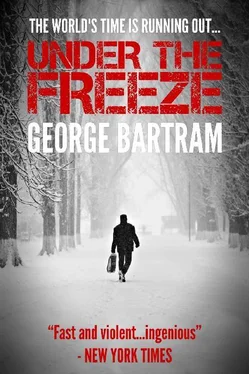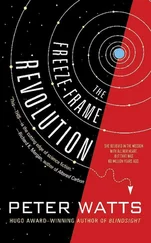Tarp got on his feet and started walking in the hot sunshine. He thought he was heading north. If the boy had been talking about Orlando, Florida, then he wanted to go north. He was thinking somewhat clearly now. His boat ought to be back in the slip at the marina, but there was no point in going there because the Agency people would have impounded it or staked it out or done something equally troublesome. He needed to go to Washington. That was about as much sense as he could make just then.
He passed through a small black community where people looked at him with a mixture of hostility and contempt, and they made no move to stop their dogs when the dogs barked and snarled. He didn’t blame them. He was not frightened anymore, so he thought the effects of the drug were passing. He had a cruel headache and he felt weak.
He washed himself in a creek and drank a lot of water from a hose at a gas station. He asked a fat black man what day it was and found that he had lost an entire day and night.
I missed my appointment with Schneider .
He traded the fat man the penknife for two candy bars and ate them sitting by a highway, waiting for a ride. Who laid on a death squad for me ? Schneider ? The funny old Englishman ? He thought of all the people at the party.
By noon he had gotten a short ride with a half-drunk real estate salesman who drove as if he were going to kill himself before the day was over; by three o’clock he was near Jacksonville with a sailor; by nine that night he was passing through South Carolina. At a truck stop he found a six-wheeler that was headed for D.C. At seven the next morning he was in the District.
“Where you goin’ at?” the driver asked him.
“The White House would be fine.”
“Oh, yeah.” The man laughed. They had been talking about football, women, war, hunting, unemployment, and the promise of space. Tarp had not slept. “Oh, yeah.”
“Drop me anywhere, then.”
“Shit, I can put you out on Pennsylvania Av. if that’s what you want.”
“That’s fine.”
“You got it.”
He got down six blocks from the White House and walked from there, turning off the avenue opposite the mansion and walking half a block to an unassuming stone entrance in a block of handsome old buildings. The only indication of the building’s identity was a very small brass plaque that read New Monroe Hotel in letters so small they were unreadable from the street. There were three steps up from the sidewalk; a man in a dark suit stood on the top step. He looked Tarp up and down — the torn sleeves, the grimy dress trousers, the mined evening shoes.
The man touched his cap.
“Good morning, sir.”
“Hello, Frederick. I’m not expected.”
“I’m sure that’s all right, sir. Go on in.” Frederick led him to a reception desk that was little more than an alcove in a beautifully paneled little foyer. There were fresh flowers on a table and a strong smell in the air of furniture polish and wax. “Mr. Tarp will be needing a room,” the man named Frederick said.
A gray-haired man with a very large mustache leaned over the reception counter. “Of course,” he said. He had red cheeks of the sort that are supposed to be associated with jollity and convivial drinking; in fact, he was a recovered alcoholic who had once held a fairly high post in the State Department. Frederick disappeared and the man held out a pen. “Good to see you again.”
“Thank you.” Tarp signed the old-fashioned book. “No luggage and no money this trip.”
“No problem, Mr. Tarp. Clothes?”
“Please.”
Only minutes after he was shown to a small bedroom on the fourth floor, another man in a dark suit appeared with a garment bag. In it were a tweed jacket and corduroy trousers that Tarp had left there some years before, along with a turtleneck shirt and a pair of old but still serviceable Cordovan shoes. A discreet cardboard box held new underwear, toothbrush, and shaving kit. In the lining of the jacket was a hundred-dollar bill and the key to a safe-deposit box in a nearby bank.
“All I’ve got is Argentine pesos,” Tarp said.
“Fifty thousand a hundred and Five to one, sir.”
“Street price?”
The man laughed. “On Argentine pesos, there isn’t a street price.” Tarp gave him a quarter million.
He put the clothes away, dropped on the bed, and was instantly asleep. Hours later he awoke as suddenly. He lay still, taking inventory. He remembered it all — the attack, the injections, the airfield. The fear. He had a lump on his head and a brutal headache.
He lay in hot water up to his chin and tried to smooth over the torn places in his mind. He was badly hurt there, not in the way the body is hurt, but with guilt and the knowledge that he had almost been killed because he had been careless. It was humiliating. He lay in the tub until the water was cold, trying to come to terms with it. The best he could do was that he had blundered but that it was still recoverable. Whatever he had gone to Argentina to do, he had botched it, and he was lucky to be alive — and he was alive only because a completely unexpected force had intervened.
Kinsella . He had not told Kinsella that he was going to Schneider’s, but he had told Grice, the fat English newsman. Grice worked for Kinsella ; that makes sense . Kinsella had saved his backside, then had turned him over to somebody who had told him to stay out of Argentina and who had then shipped him home. That says Argentine air force . Permission to land at Orlando ; some sort of routine mission , with U . S . knowledge . Returning damaged goods . They had dumped him without hurting him, meaning that they had known he was American and had assumed he was working for the U.S. Meaning that they did not know about Repin and Havana, perhaps did not know about Maxudov and the plutonium. Good guys or bad guys ?
Tarp surged out of the cold water and stalked to the telephone. Water turned to dark stains on the New Monroe’s carpeting. He ignored it, ignored his own shivering, dialed a number in Virginia.
“Three nine seven five,” a male voice said.
“This is Mr. Black. Tell Mr. Green I want to see him.”
“Yes, sir.”
“As soon as possible. Call me at the service number and have them relay.”
“Yes, sir.”
He toweled himself dry with a towel as thick as the carpet and rubbed his skin to a bright pink. It was getting dark outside now. He saw himself in the window, draped in the towel as in a toga: straight ahead were the stark branches of the trees, silhouetted against a cold sky; below, as if part of another world, was the White House, lighted, its windows cheerful and bright and probably ready for an evening reception.
There was a robe in the closet, courtesy of the hotel. He put it on, went again to the telephone.
“Front.”
“It’s Mr. Tarp. Can I get some food?”
“Of course, sir. You’re a vegetarian, I believe.”
“Right.”
“Let me have a word with the kitchen.”
They sent up two poached eggs on a bed of lightly cooked spinach, a cold smoked trout, a huge dish of fresh fruits, and a plate of cheeses. He limited himself to a single glass of clean-tasting white wine — one of four that were sent along — and ate his way through the eggs, the trout, a salad, three fruits, and two cheeses. Then he sipped French coffee and waited.
At seven the telephone rang.
“Yes.”
“Unarmed services here.”
“Yes.”
“Mr. Green will be at Mr. White’s and will meet you in the square at plus three.”
“Thank you.”
Читать дальше












